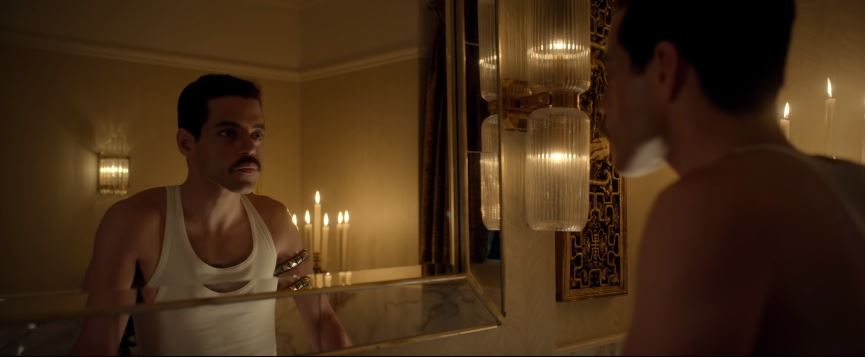‘Bohemian Rhapsody’ Biopic Gives Freddie Mercury Agency Over His Sexuality and Illness

Image via YouTube. / CC BY-NC 2.0.
Though “Bohemian Rhapsody” today is a song so enduringly popular that it can be pulled off of just about any willing (or unwilling) listener’s lips, the song originally received among critics a scattered, halting applause, mingled with the jeering of popular publications that called it “pretentious and irrelevant,” or, more creatively, a “brazen hodgepodge.” In a truly cinematic twist, the new biopic by the same name that celebrates the triumphs and falls of Queen’s late lead singer Freddie Mercury, has similarly achieved a lukewarm reception.
Sure, “Bohemian Rhapsody” falters at points with its pacing and balancing its many plot threads (after all, it is difficult to accurately fit two decades of a man’s life into two hours), but that does not sink the ship (a ship which is more a luxury cruise liner with the most dizzying, bordering on tacky, on-deck entertainment possible). Among its virtues, there is one aspect of the flashy picture that nearly all critics can agree on: Rami Malek’s show-stopping, “marvelous” performance as Mercury, a man who now feels larger-than-life in his legacy and eccentricity.
It’s true: there is no amount of exaggeration or overstatement that can be made about Malek’s performance, which manages to be both dramatic and sensitive, self-assured yet vulnerable. When Mercury tells the man who is later his boyfriend, Jim Hutton, that he is afraid of life’s “in-between moments,” the audience does not need to be convinced — Malek has lingered on these moments throughout the film up until this point with the slightest trace of fear. And then, when he is onstage, Malek moves with all of Mercury’s characteristic chaos and euphoric rhythm.
Beyond the performance, the entire film’s craft around the nuances of Mercury’s character makes it a success. It lovingly teases at things like Mercury’s love of cats and his iconic quotes such as deeming himself “a musical prostitute.” It does not shy away from showing his faults, from times he strayed towards conceitedness to his struggle with addiction. Although, what is the most strikingly honest – and critically important – about “Bohemian Rhapsody” and its portrayal of Freddie Mercury, is the care with which it very openly addresses him as a bisexual man of color who suffered from, and ultimately died of, AIDS in 1991 at the age of just 45.
Ashley Lee with the LA Times argues that the film’s exploration of his ethnicity and religion mirrors what Mercury himself did. Throughout the film, Mercury encounters racism in the form of racial epithets incorrectly suggesting he is from Pakistan. In truth, Mercury was from Zanzibar and spent large parts of his adolescence in India, with his family identifying as Indian Parsi, followers of the Zoroastrian religion. In reality, Mercury did not speak much publicly of his racial or religious background, but did not disavow it either. It is unclear if the name “Freddie Mercury” was an attempt to distance himself through the anglicanization of his birth name, Farrokh Bulsara. However, due to anti-immigrant racism in England, it may have been an act of assimilation necessary for survival, or a practical career-oriented decision.
“Bohemian Rhapsody” does not linger on his racial or religious background, but connects it intimately to his tumultuous relationship with his parents, which begins to repair by the film’s conclusion. Malek’s Mercury begins singing and playing on the piano to tune out his parents when they explain to his bandmates his birth name and briefly detail their ethnic origin. His bandmates express surprise that Mercury was not born in London, as he had previously told them. Beyond this, Mercury’s connection to his racial background is only lightly touched upon.
What is intriguing about this presentation is that the public dimension of this aspect of Mercury’s identity is not controlled by him. Despite his best efforts at appealing to and assimilating with a white Euro-American audience, he still sticks out, he is still discriminated against and attacked with slurs throughout his life as displayed in the film. The information of his birth name and place are not shared by his own volition.
This idea of powerlessness in his identity follows Freddie throughout his life in “Bohemian Rhapsody.” When he first comes out to his ex-wife and life-long friend, Mary Austin (played by Lucy Boynton), she sadly remarks that he cannot choose or decide his sexuality, that it is not his fault. And, while Mercury defies gender norms constantly through his choice of traditionally feminine clothing, when he dresses in drag – still sporting his signature mustache – for the music video “I Want to Break Free,” Queen is banned from MTV’s channel in the United States.
What the film does remarkably well is a kind of narrative resistance against this powerlessness, a push back against the stripping of Mercury’s voice in relation to himself. Though systemically he had no power over his oppression, Mercury gets to choose when and how he gets to name his sexual orientation. Many biopics of historical LGBTQ+ figures ignore or brush past the person’s orientation or gender identity, such as the downplaying of Alan Turing’s gay identity in the 2015 biopic “The Imitation Game.” There is no such blink-and-you’ll-miss-it game in “Bohemian Rhapsody.” Though there is hardly any screen time allowed to Mercury’s relationship with Jim Hutton (played by Aaron McCusker), and the influence of his bisexuality over his art is not delved into, his sexual orientation is explicit and at the forefront of the picture.
Though first nearly coaxed out of the closet by Paul Prenter (Allen Leech), who manipulates and isolates Mercury through the second act of the film, Mercury is shown to have lingering, yearnful glances at other men. It is as though the narrative itself gives Mercury time to breathe and discover himself until he is ready to announce it himself. No character puts a label on him until he does: “I think I am bisexual” he tells Mary one night, putting a definitive word on the experience for the audience, too. The word is revolutionary itself, since so much media with bisexual characters dances awkwardly around the term. His love stories with Mary and Jim both feel wholly natural; with Mary, there is a youthful enthusiasm, whereas with Jim there is an older, slowly-developing maturity.
The narrative of “Bohemian Rhapsody” offers its control of crucial plot details to Mercury again when his AIDS diagnosis is not revealed until he chooses to reveal it to his bandmates. Before this point, Mercury is shown clearly unwell, coughing painfully, and, on one occasion, coughing up blood. News reports on AIDS play on the television in the background of a scene, and if a viewer did not already know Mercury’s story before walking in, the connection is subtly made between the epidemic and his own failing health. There is even a scene with Mercury speaking with a doctor about treatment options, but the illness is still not named at that point. Similar to Mercury naming his bisexuality, he gets the agency to speak the truth of his socially taboo condition. There is a deliberation to his speech as he begins his confession by telling his bandmates that they will hear the truth from him, and not anyone else.
The importance of this is not lost: in the hysteria of the 1980s, many gay and bisexual men were assaulted, made into social outcasts and unclean pariahs due to the homophobic perception that the illness is linked to sexual orientations. And yet, the American and British public education systems still fail at teaching the truth about HIV, AIDS, and both governments’ apathy during the crisis.
Again and again, “Bohemian Rhapsody” demands a kind of personal autonomy for its enigmatic lead, allowing him the dignity of not erasing his story, but instead letting him be the master of how it is told, when a deeply racist and homophobic society would rather such stories not be told at all. Better yet, the film does not use Mercury’s illness as a ploy to sink to the levels “trauma porn” — the voyeuristic exploitation of a person or character’s trauma for shock value (or perhaps Oscar nominations). Malek’s Mercury remarks emotionally that he will not be made into the suffering poster boy for AIDS (something Mercury in real life appeared to fiercely believe in, as he did not publicly announce his diagnosis until just 24 hours before his death), and the film refuses to let him become that, either
The film ends on a high note, one of endurance and wonder: Queen’s hit performance for the Live Aid benefit concert. His life is no one simple thing, and the biopic does not diminish his suffering, or let it define him. Though Farrokh Bulsara, or Freddie Mercury’s, diagnosis hangs over the band in the film (an artistic liberty, as it is widely believed Mercury could not have known his diagnosis at this point in reality), his friends and lovers past and present watch admiringly as Mercury does what he says he was born to be — perform in a way that is nothing short of legendary.




